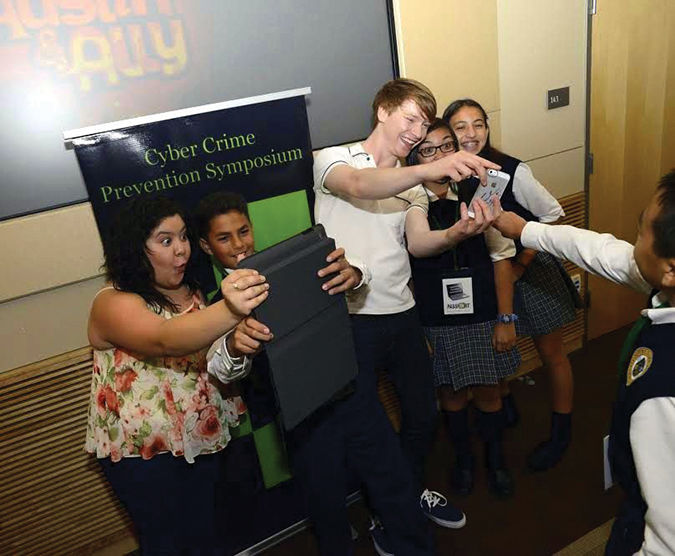More than 400 educators, parents, and middle and high school students from across the archdiocese attended the sixth Annual Cyber Crime Prevention Symposium at the California Endowment Center in downtown L.A. on Oct. 29 to learn up-to-date information about staying safe online and how to avoid Internet predators, cyber bullies, malicious apps and more.
Presented by the Inter-Agency Council on Child Abuse and Neglect (ICAN), the Archdiocese of Los Angeles, the Federal Bureau of Investigation, the Los Angeles City Attorney’s Office, local law enforcement agencies and other sponsors, the yearly symposium offers the latest cyber safety tips through age-appropriate presentations for students, as well as sessions intended specifically for adults.
Deputy City Attorney Tracy Webb discussed some of the dangers lurking at the fingertips of most teenagers via smart phone apps and the Internet. In a workshop titled “In Their Hands,” Webb shared some of the latest cyber trends, including “text bombing” apps, which allow users to schedule the auto delivery of hundreds of pre-written texts (often with harassing messages) to select recipients.
Other trends include salacious sites for posting “revenge porn” pictures and videos and apps for chatting with random strangers (e.g., Chatroulette, Omegle).
“When you take that underdeveloped [teen-aged] brain — that frontal lobe that’s not fully developed [until the age of 25] — and you couple it with that powerful digital computer in their hands, sometimes it spells trouble,” Webb explained.
In his presentation “Do U Knw Hu Ur Talkn 2?,” Detective Carlos Monterroso of the LAPD’s Regional Internet Crimes Against Children Unit gave an overview of crimes he has investigated involving teenagers who thought they were chatting online with a fellow teen only to discover — sometimes too late — that they were being duped by a pedophile or a would-be human trafficker.
Monterroso offered straight-forward, no-nonsense advice to the high school group he addressed about how to keep cyber socializing from becoming real-life peril: don’t “friend” people you don’t know; don’t share personal information; if you wouldn’t post a photo on your family fridge, don’t post it online; if you wouldn’t say something in person, don’t say it online; and, if you have to lock your bedroom door to engage in an online activity, “Stop — don’t do it!” he warned.
He closed with two alarming reminders: The EXIF data on smart phone photos can contain GPS coordinates that can lead a stranger directly to your home, and, “Once you post something online, it’s online forever.”
For Sara Shenouda, a counselor at Chaminade College Preparatory Middle School in Chatsworth, the symposium was an eye-opening experience, “Not just for me,” she told The Tidings, “but also for the students we brought with us.”
She said some of the presentations that relayed the potential dangers found in the ever-evolving world of social networking apps for smartphones — such as privacy infringements and “stranger dangers” — had spooked some of her students.
“And for us adults having this knowledge really helps us know how to monitor them, and not just put our heads in the sand and act like it’s not a big deal,” Shenouda said.
According to Suzanne Healy, archdiocesan coordinator of Victims’ Assistance Ministry and Symposium planning committee member, the feedback she received from both adults and students during the half-day event indicated “another successful symposium” thanks to the work of many city, county, and U.S. law enforcement agencies and non-profit sponsors “who freely offer their hard work and true dedication [to] prevention training for our school students, parents and staff.”
“[Planning the symposium] is a yearlong effort and collaboration of many talented persons committed to keeping our children safe online,” Healy said.
During the symposium, organizers invited schools to participate in the 2014 Cyber Crime Challenge. Sponsored by ICAN, the Cyber Crime Prevention Subcommittee (CCPS) and law enforcement agencies, the competition encourages students to develop creative and multi-faceted cyber safety school programs.
This past year’s winners — announced in May 2014 — were St. Thomas More School in Alhambra, which won $1,000 for their school-wide anti-bullying education efforts; and St. Francis de Sales School in Sherman Oaks, which won $500 for their student/parent cyber training.

